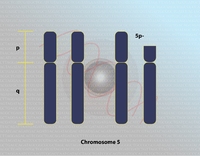Hello, I’m the Cri du Chat syndrome which in French means cry of the cat, or I’m also known as 5p- (five p minus) syndrome, I also have other names that people call me but I just name two for now. As you might know there are 23 pairs of chromosomes in human DNA and I’m caused by a deletion of chromosome 5.
Its why I’m also known as the 5p-, the 5 stands for the fifth chromosome, the “p” stands for portion of the chromosome and the minus(-) means that part of the chromosome is missing. I’m not usually inherited, so my host’s parents didn’t carry me and nor do their family history experience me at all, I’m caused by the deletion mutation in the chromosome which occurs while the baby is developing, though scientists are still struggling to figure what exactly caused that. They sometimes say that a child inherits what is called an unbalanced translocation,
where he/she would have a chromosomal re-arrangement with extra or missing genetic information (and this happens randomly and parents have a balanced translocation which when there is a even or balanced amount of genetic info, so in other words nothing is missing or have been gained, everything is even. In an estimate of 1 in 20,000 to 50,000 newborns can be affected.
The symptoms I give to my host is; as an infant, their cry would sound like a cat meowing which gives my name “cry of the cat”, 1/3 of children would loss the cry after the age of 2 years. Other symptoms that my host may experiences from me are are feeding problems, low birth weight, low muscle tone when are young, small round head, small jaw, excessive drooling (drooling a lot), wide eyes, speech and motor delays (meaning there speech would range from few words to short sentences, or behavior problems like hyperactivity, aggression or temper tantrums. My host can not be cured of me but they always undergo treatments to work to my host’s potential. The treatments they usually do is physiotherapy to improve the muscle tone, speech therapy, communication alternatives, such as sign language because my host experiences speech delayed and occupational therapy to teach coping strategies. And the parents attend counselling, learn information, go to support groups and advocacy.
Part II
All the questions I’ve asked throughout this project;
- What is Cri du Chat?
- How is it inherited?
- What caused it?
- What are the symptoms?
- Is it curable?
- When does the cry happen?
- Can the host loss the cry?
- Why is it also called 5p- syndrome?
- What is balanced translocation?
- What is unbalanced translocation?
- What are the treatments?
Questions for future projects that are out outside of this topic. Makes me wonder;
- What does the fifth chromosome determine?
- How does the sequence of the 4 nitrogen bases of the helix affected the instructions to make me or you? How is it written?
- How does DNA come together?
Sources
- https://www.betterhealth.vic.gov.au/health/conditionsandtreatments/cri-du-chat-syndrome
- https://www.youtube.com/watch?v=TYQrzFABQHQ
- http://www.fivepminus.org/5P-_Syndrome
- https://ghr.nlm.nih.gov/condition/cri-du-chat-syndrome#statistics
- https://en.wikipedia.org/wiki/Cri_du_chat
- https://www.google.ca/?gws_rd=ssl#q=cri+du+chat
Images
- https://ghr.nlm.nih.gov/condition/down-syndrome
- https://ghr.nlm.nih.gov/condition/cri-du-chat-syndrome#statistics
As you could see above, there is a list of various of website I explored to find the information. I used search engines like Google and Bing and comparing them, I both received same and different results between them when researching. To check if the info was correct at least, I compared all these cites to see which pieces of info are on each website and those pieces of info I had found are included into this post. While I was researching, I decided to look up cri du chat in my big book of the “Illustrated Oxford Dictionary” and (I’ll say it again, its a huge heavy book, but I didn’t find what I was looking for so I then I looked for “syndrome”, hoping to find a short list of syndromes with the page number. It turned out negative, but it didn’t hurt to try. So yeah.
What I was interested about this project is how DNA works, like how a certain step in the sequence of DNA can change how you develop. Maybe I’ll try get a better understanding on how DNA works like, what is the difference between one organism’s DNA sequence to another or how is DNA written?

